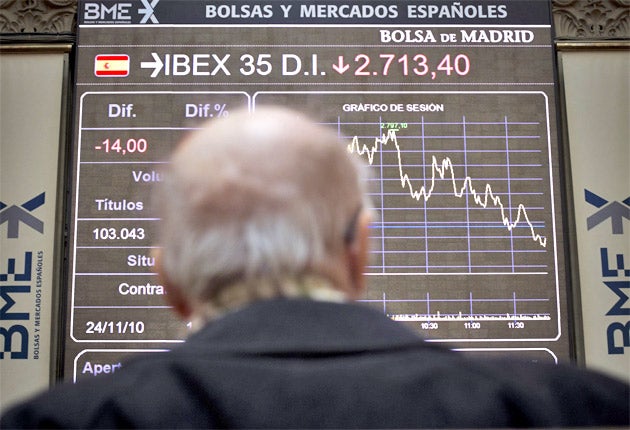Desperate fight to save the euro
Survival crisis for the single currency as fears of further bailouts rise in Spain, Portugal and Belgium

Your support helps us to tell the story
From reproductive rights to climate change to Big Tech, The Independent is on the ground when the story is developing. Whether it's investigating the financials of Elon Musk's pro-Trump PAC or producing our latest documentary, 'The A Word', which shines a light on the American women fighting for reproductive rights, we know how important it is to parse out the facts from the messaging.
At such a critical moment in US history, we need reporters on the ground. Your donation allows us to keep sending journalists to speak to both sides of the story.
The Independent is trusted by Americans across the entire political spectrum. And unlike many other quality news outlets, we choose not to lock Americans out of our reporting and analysis with paywalls. We believe quality journalism should be available to everyone, paid for by those who can afford it.
Your support makes all the difference.The euro plunged further into crisis yesterday as investors sold off Spanish, Portuguese and Belgian government bonds in record numbers on renewed fears that those nations would follow Greece and Ireland into the financial emergency ward, undermining confidence in the single currency.
The spreading contagion suggests that the markets now view the break-up of the euro as a realistic possibility, and that "shock and awe" efforts to shore up individual economies with huge bailouts have not succeeded in insulating their neighbours from infection. Spain, in particular, is regarded as being "too big to save". Should Spain eventually need assistance it would also imply a much larger UK bilateral loan than the £8bn offered to Ireland – perhaps £20bn or £30bn.
The extra "risk premium" demanded by investors to hold Spanish government debt hit new highs during trading yesterday, and the cost to Madrid of raising money over a three-month period is the same as that demanded from the German government over a five-year term, reflecting an extreme level of nervousness about the Spanish state's ability to repay its debts. The looming possibility of Spanish insolvency would dwarf the problems of Greece, Ireland and Portugal combined.
There were also what analysts called "clear signs of stress" across the European financial system, as banks were forced to turn to the European Central Bank for emergency funding. The ECB has so far lent some €531bn (£449bn) to European financial institutions at ultra-cheap rates of interest, effectively a life support system that the ECB president Jean-Claude Trichet believes is unsustainable. As so many nations' banking systems are state-guaranteed or nationalised, this also adds to the pressure on governments across the EU to find a more permanent solution to the crisis.
Slovakia's Finance Minister, Ivan Miklos, yesterday become the latest European figure to question the euro's long-term survival, saying that "the risk of a eurozone break-up is very real". Slovakia joined the single currency last year. On Tuesday, the German Chancellor, Angela Merkel, reflected the deep anxiety felt in Germany about events when she commented that the euro was in an "exceptionally serious" position. Herman Van Rompuy said last week that the European Union itself was in a "survival crisis". Or, as Chancellor Merkel has put it: "If the euro fails, Europe fails." A poll of economists conducted by Reuters revealed that an overwhelming majority expect a bailout next for Portugal.
But it is Spain that offers the single greatest challenge to the future of the euro. Many fear that even the resources of the €750bn European Financial Stability Facility, the vehicle for the current round of bailouts, will be insufficient to stem the tsunami of money flowing out of these stricken countries. So far the bailouts of €110bn and €80-€90bn for Greece and Ireland respectively have been big enough to meet their financing needs for the next two to three years. But such an exercise for Spain would mean finding a "whopping" €420bn, say analysts at Capital Economics. It could be more, however; Spain's banking system, hit hard by the bursting of a property bubble, has liabilities of €3,464bn, compared with €1,658bn in Ireland.
Jennifer McKeown, a senior European economist, added: "Such concerns are understandable, given Spain's resemblance to Ireland. Public borrowing there surged during the recession after a property-fuelled boom. Its banks are fragile and sky-high unemployment and falling house prices point to a risk of further huge defaults on domestic loans. Meanwhile, Spain's weak competitive position leaves little scope for it to export its way out of the economic gloom."
With Belgium shaping up as the next "domino" to fall, the contagion of the euro crisis has spread from the peripheral and southern nations for the first time to a northern economy at the heart of the European Union.
Join our commenting forum
Join thought-provoking conversations, follow other Independent readers and see their replies
Comments